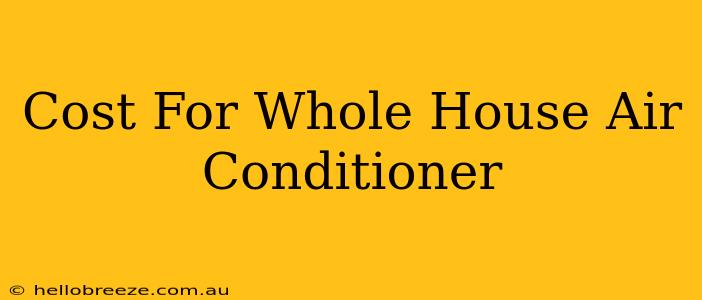Choosing a new whole house air conditioner is a significant investment, so understanding the costs involved is crucial. This guide breaks down the various factors influencing the price of a whole house AC unit, helping you budget effectively.
Factors Affecting the Cost of a Whole House Air Conditioner
Several key factors determine the final cost of installing a new whole house air conditioner. These include:
1. System Size (BTU Rating):
The size of your AC unit, measured in British Thermal Units (BTUs), directly impacts the price. Larger homes or those with poor insulation require higher BTU units, which are generally more expensive. Getting the right size is critical for efficiency and cost-effectiveness. An undersized unit will struggle to cool your home, while an oversized one will cycle on and off frequently, leading to higher energy bills and shorter lifespan.
2. SEER Rating:
The Seasonal Energy Efficiency Ratio (SEER) measures the unit's energy efficiency. Higher SEER ratings (typically 14-21+) mean lower energy bills over the unit's lifetime, but also a higher upfront cost. Investing in a higher SEER unit is a wise long-term decision, although the initial investment will be higher. Consider the long-term savings when comparing prices.
3. Type of System:
Several types of air conditioning systems exist, each with varying price points:
- Split Systems: These are the most common type, consisting of an outdoor condenser unit and an indoor evaporator coil. They offer flexibility in placement and are generally affordable.
- Heat Pumps: Heat pumps provide both heating and cooling, offering potential cost savings in the long run. They are usually more expensive upfront than standard AC units.
- Ductless Mini-Splits: These are a great option for adding cooling to specific rooms or zones without extensive ductwork. While individually they might seem more expensive per unit, they may prove more cost-effective overall than a full home system replacement in certain scenarios.
4. Installation Costs:
Installation costs can significantly add to the overall price. Factors such as the complexity of the installation (new ductwork, refrigerant lines, electrical work), accessibility of the location, and the installer's labor rates all play a role. Always get multiple quotes from reputable HVAC installers.
5. Additional Features:
Many modern AC units offer advanced features that can enhance comfort and efficiency, but also increase the cost. These include:
- Smart thermostats: Offer remote control and energy-saving features.
- Variable-speed compressors: Provide more precise temperature control and quieter operation.
- Air purifiers: Improve indoor air quality.
Estimating the Cost: A Range of Possibilities
The total cost of a whole house air conditioner can range significantly depending on the factors mentioned above. Generally, you can expect to pay anywhere from $3,000 to $15,000 or more. Less efficient, smaller units will fall towards the lower end, while high-efficiency, larger units with advanced features will fall towards the higher end.
Tips for Saving Money:
- Shop around and compare quotes: Get at least three quotes from different HVAC contractors.
- Consider financing options: Many contractors offer financing plans to make the purchase more manageable.
- Take advantage of rebates and tax credits: Some government programs offer rebates or tax credits for energy-efficient AC units.
- Maintain your unit regularly: Regular maintenance can extend the life of your AC unit and prevent costly repairs.
By carefully considering these factors and doing your research, you can make an informed decision about purchasing a whole house air conditioner that meets your needs and budget. Remember, investing in a high-quality, energy-efficient system can save you money on energy bills in the long run.

